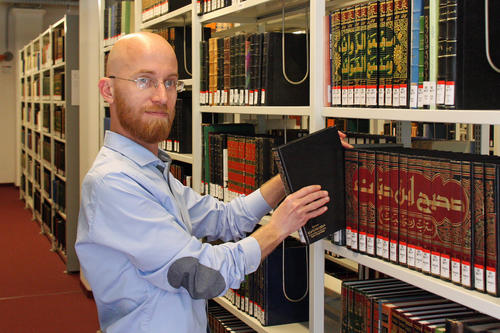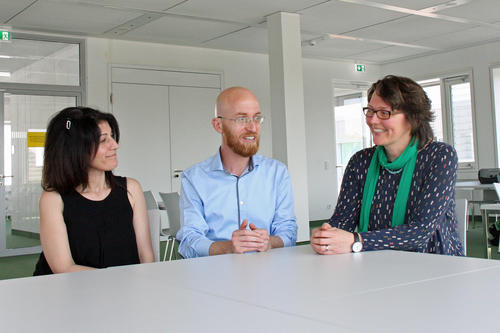“Now I’m hopeful again”
Abdulsalam Jawish, a librarian who fled Syria in 2015, recently completed an internship at Freie Universität’s Campus Library.
Jun 03, 2016
Abdulsalam Jawish completed an internship at the Campus Library.
Image Credit: Manuel Krane
Abdulsalam Jawish is shown with Jouliette Kourie (left), the representative for refugee librarians, and the project’s coordinator, Cosima Wagner (right).
Image Credit: Manuel Krane
Abdulsalam Jawish had worked as a librarian in Syria and the United Arab Emirates for seven years. Last summer he arrived in Germany as a refugee. An asylum appeal that he launched in October 2015 is still pending, thus barring him from work. “I was eager to do something, and I didn’t want to wait until my bid for asylum has been decided,” says Jawish. To this end, he got in touch with Freie Universität and inspired the initiation of an internship program for refugee librarians. In the meantime, he is also the first to have completed it.
Jawish traveled by boat across the Mediterranean from Turkey to Greece. From there he made his way to Germany along the Balkan route on trains, trucks, and on foot. Arriving in Berlin after an almost three-week-long journey, he was granted refugee status some six weeks later. Since Jawish can’t get a work permit while his asylum application is being processed, he seized upon the idea of doing an internship.
College in Syria
Jawish holds a Bachelor of Arts in Library Sciences and is very knowledgeable in his career field. “In fact,” he puts forth, “I was pleasantly surprised how similar the core work is in Germany and Syria.” In Germany, however, different types of software and databases are deployed. Apart from the language, the biggest challenges faced by Jawish were the library management and classification systems in use here in Germany. “You really need to get acquainted with a lot of technical terminology,” he says. And while he was able to easily communicate with colleagues, he still needed to learn the ropes on this software.
The Campus Library staff was delighted with his skills. Cosima Wagner, the project coordinator, points out that Jawish immediately spotted two incorrectly shelved books during the first week of his internship as they walked through the library’s Oriental section. “That’s when I knew that this is where he belongs. It doesn’t matter whether you‘re working at a library in Syria, Japan, or Germany – it’s the same the world over,” says Wagner.
Internship Program
The “Integration of Refugee Librarians into the Academic Library System” program came into being because Abdulsalam Jawish and another refugee expressed interest in pursuing an internship at one of Freie Universität’s libraries. The Campus Library was chosen as the central point of reference because of the nature of its book holdings and its director, Martin Lee, readily agreed to support the program. Andrea Tatai, the deputy director of the University Library, thereupon worked out a program with Cosima Wagner and project manager Jouliette Kourie. This program is also supported by some of the other directors in Freie Universität’s library system. Refugees are eligible to apply if they hold a temporary residence permit while their asylum claim is being processed.
In addition to an introduction into Freie Universität’s academic library system – with work shadowing in the departmental libraries – the internship also entails intensive bilingual training in cataloging software, media processing, and the Regensburg Classification Scheme, the shelf classification system applied by the libraries of Freie Universität. But coaching in terms of intercultural communication and orientation with regard to the reality of working life in Germany is also part of the program as is help in subsequently finding a job. It is in this context that the project position “representative for the professional integration of refugee librarians” was established in cooperation with the University Library and the Department of History and Cultural Studies. Currently, Jouliette Kourie holds this position.
Arab-German Glossary
During his internship, Jawish compiled an Arab-German glossary for libraries; Arabic-speaking staff can make use of it as can students who aren’t yet very familiar with German library terminology. “In part, the library system uses vocabulary that even native speakers aren’t familiar with – vocabulary that refugees would tend not to be taught in their German classes,” Cosima Wagner notes. “During his internship, Mr. Jawish was keen on doing hands-on work and producing something with staying power rather than just observing – and this glossary can be considered a final project of sorts,” Jouliette Kourie suggests. Currently it is being discussed in what form this reference work can be made available to library staff and students.
Now that his internship at the Campus Library has ended, Jawish is applying for other internships while also hoping that his asylum application will soon be approved so that he can finally get a job and make a living on his own. “I want to return something to German society,” says Jawish. “Prior to the internship, I had my doubts that I could succeed in doing so but now I’m hopeful again.”
Further Information
Refugees interested in more information on the “Integration of Refugee Librarians into the Academic Library System” internship program – or applying to it – can contact Jouliette Kourie or Andrea Tatai.
- Jouliette Kourie, Campus Library: Natural Sciences, Cultural Studies, Education, Mathematic, Computer Science, and Psychology, Email: kjoulie@zedat.fu-berlin.de
- Dr. Andrea Tatai, University Library, Deputy Director, Tel: +49 30 838 57100, Fax: +49 30 838 51732, Email: andrea.tatai@fu-berlin.de


